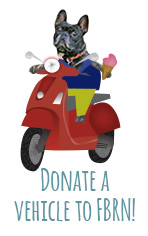If you are thinking of adopting a dog from us, be sure your expectations are in line with reality.
|
Clicquot |
Many rescue dogs come with baggage, whether emotional or physical, and before you think about applying for a rescue dog, think about what you can manage. Rescue dogs aren't for everyone, and they are certainly not a way to get an inexpensive Frenchie. Many adopters find they will spend as much on a rescue dog in vet bills as they would had they bought a Frenchie from a reputable breeder.
The biographies of our dogs are extensive, so you should have a good idea of whether the dog is good with kids or other dogs, whether the dog is house trained and crate-trained, and any ongoing medical concerns he may have.
Once you apply, you should be prepared for a call from the foster parent, and you should know we'll be calling your vet to make sure your animals are well cared-for. If the calls are positive and your family seems a good fit for the dog, we'll move on to a home visit. It's important you know that this is a required step. A volunteer will come to your home and make sure the fence (if there is one) is in good shape, make sure everyone in the family is on board with the idea of a new dog, make sure the house doesn't have any dangerous plants or wide-set railings a dog could fall through, and go over your questions with you.
|
Lentil
Ginny |
Once the home visit is completed, the application and home visit are forwarded to the Board of Directors, who will look over the documents and vote whether to approve the adoption.
When your adoption is approved, pick up can be arranged. You'll be asked to sign a contract that assures FBRN that in the event you can no longer take care of the dog, you will return the dog to our care.
When you arrive to pick up the dog, it's a great idea to have a tag with your information on it ready to go. Many dogs are lost during transports, and having your current information on the dog will be key to getting the dog back. There will likely be toys or some personal items coming home with you from the foster family residence.
Try to take a few days to settle in with your dog. If you have a dog, for the first day or two allow the Frenchie to hang out with you in a room separate from other dogs. Be calm and let her come to you. If she wants to stay in her crate, let her. You can stop by with treats from time to time. Let her get used to the new sounds and smells and the rhythm of the house. Your dog's foster parent will describe slow introductions to resident dogs to you.
Start familiarizing your Frenchie with her new schedule as soon as you can. You should absolutely expect the stress of changing homes may cause your dog to lose her housebreaking for a time, and you may have to go back to square one, crating when you aren't paying attention, taking her outside immediately, giving exuberant praise for pottying outdoors, etc. Being realistic about the fact that most dogs are not plug and play will prevent stress and disappointment.If you have children, it's key that all interactions between dogs and kids must be supervised, for everyone's safety. Children aren't born knowing how to be with dogs, and even if you already have a dog or two, not every dog is the same. While one dog will allow a child to poke him in the eye and pull his lips and ride on his back, others will object. If you can't be in the room with your child and the dog, the dog should be in a room by himself or safely in his crate with a toy. Children are especially liable in the first days following adoption to be excitable and to want to carry the dog or show them affection. Difficult as it is to ask your kids to restrain themselves, your dog will be happier if you can ask children to remember to be calm and gentle.
Wait a few days to introduce your new dog to your friends. Let him get to know and trust you first, then widen his circle of familiar and trusted people.
Sign up for pet insurance.
|
Maurice |
Dog-thefts are on the rise all over the country. It's not safe to leave your dog outside in the yard unattended. Dog-doors are not safe, either. Many areas are experiencing a rise in coyote and cougar sightings, and we recently heard of a California family who lost two Frenchies to cougars on two different occasions. Walk your dog on a lead or exercise him in the yard in your company.
Be aware that dogs take time to reveal themselves. For the first 3-6 weeks, dogs are learning who's the boss, where the treats are, what the routine is, who is a good belly-rubber, and who to avoid. Their true personalities may be evident right from the start, but it's likely that your new dog will be holding back until he is confident of his place and the routine.
Remember, you are adopting a rescue dog to give a homeless Frenchie a second chance. Adoption is something you do to make both your lives better. Keep in mind that your Frenchie wants to fulfill his purpose to be a loving companion dog, but his first instinct in the first few days will be to survive and be sure the new place is safe for him and that you are trustworthy. By the time you take your dog home, FBRN will have been convinced you are a trustworthy family, but your dog has to learn that too.










